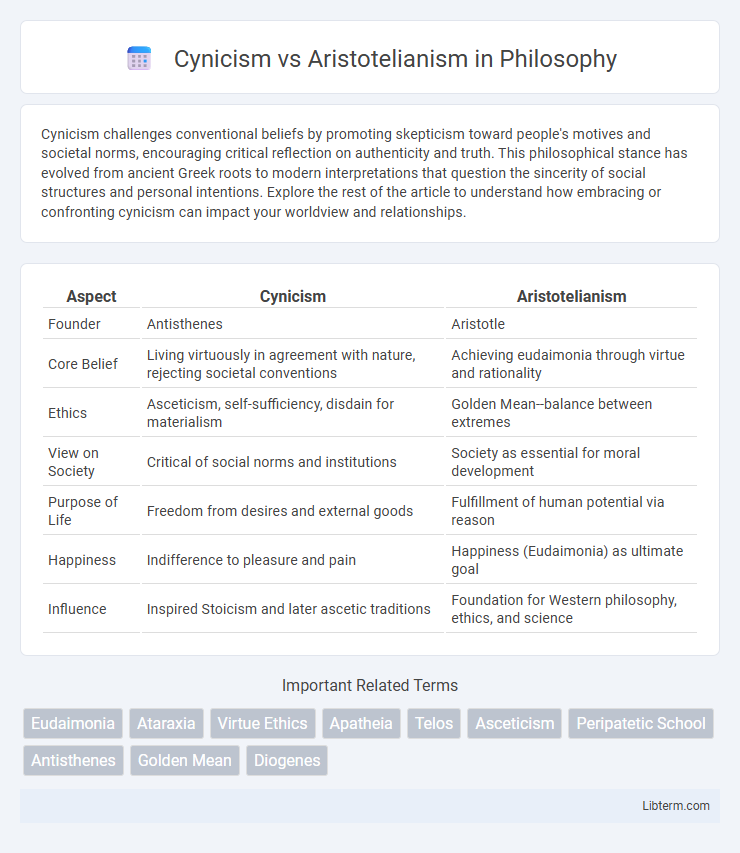Cynicism challenges conventional beliefs by promoting skepticism toward people's motives and societal norms, encouraging critical reflection on authenticity and truth. This philosophical stance has evolved from ancient Greek roots to modern interpretations that question the sincerity of social structures and personal intentions. Explore the rest of the article to understand how embracing or confronting cynicism can impact your worldview and relationships.
Table of Comparison
| Aspect | Cynicism | Aristotelianism |
|---|---|---|
| Founder | Antisthenes | Aristotle |
| Core Belief | Living virtuously in agreement with nature, rejecting societal conventions | Achieving eudaimonia through virtue and rationality |
| Ethics | Asceticism, self-sufficiency, disdain for materialism | Golden Mean--balance between extremes |
| View on Society | Critical of social norms and institutions | Society as essential for moral development |
| Purpose of Life | Freedom from desires and external goods | Fulfillment of human potential via reason |
| Happiness | Indifference to pleasure and pain | Happiness (Eudaimonia) as ultimate goal |
| Influence | Inspired Stoicism and later ascetic traditions | Foundation for Western philosophy, ethics, and science |
Understanding Cynicism: Origins and Core Principles
Cynicism originated in ancient Greece, founded by Antisthenes, a disciple of Socrates, emphasizing living in accordance with nature and rejecting societal conventions. Core principles include asceticism, self-sufficiency, and disdain for material wealth, promoting virtue as the highest good. Cynics advocate for a life free from artificial desires, contrasting with Aristotelian ethics focused on achieving eudaimonia through rationality and moderation.
Aristotelianism Explained: Key Tenets and Influence
Aristotelianism, rooted in Aristotle's philosophy, emphasizes the pursuit of eudaimonia through the cultivation of virtue and practical wisdom (phronesis). Central to this tradition is the concept of the "Golden Mean," advocating balance and moderation between extremes in ethical behavior. Aristotle's influence extends across ethics, politics, and metaphysics, shaping Western thought with its systematic approach to understanding human purpose and the natural world.
Historical Context: Development of Both Philosophies
Cynicism originated in the 4th century BCE with Antisthenes, a student of Socrates, emphasizing asceticism and living in accordance with nature to achieve virtue. Aristotelianism, founded by Aristotle in the same period, developed a comprehensive system of ethics, metaphysics, and politics, focusing on achieving eudaimonia through rationality and the cultivation of virtues. Both philosophies emerged as responses to the socio-political changes in ancient Greece, shaping diverse approaches to virtue and the good life.
Life Purpose: Cynic Simplicity vs. Aristotelian Eudaimonia
Cynicism advocates for a life purpose centered on simplicity, self-sufficiency, and rejection of societal conventions, emphasizing freedom from material desires as the path to happiness. Aristotelianism defines life purpose through eudaimonia, a fulfilled and virtuous life achieved by practicing reason, moral virtues, and flourishing within a social community. These contrasting philosophies highlight a fundamental divide between minimalist detachment and active engagement in the pursuit of human excellence.
Ethics: Virtue in Cynicism and Aristotelianism
Cynicism emphasizes virtue as living in accordance with nature and rejecting societal conventions, promoting self-sufficiency and freedom from material desires. Aristotelianism defines virtue as a mean between extremes, advocating for the development of character through rational activity and the pursuit of eudaimonia, or flourishing. Both philosophies prioritize ethical living, but while Cynicism challenges social norms to attain virtue, Aristotelianism integrates virtue within society through balance and practical wisdom.
Attitude Towards Society: Withdrawal vs. Engagement
Cynicism advocates for withdrawal from societal conventions and materialism, emphasizing living in accordance with nature and rejecting social norms as sources of corruption. Aristotelianism promotes active engagement with society, viewing humans as social beings who achieve eudaimonia through virtuous participation within political and communal life. The Cynic detaches from public life to attain personal virtue, whereas the Aristotelian cultivates ethical character through societal involvement and civic responsibility.
The Role of Reason: Contrasts in Cynic and Aristotelian Reasoning
Cynicism emphasizes living in accordance with nature through asceticism and rejects conventional desires, valuing practical reason as a tool to attain freedom from societal constraints. Aristotelianism, by contrast, upholds reason as the faculty that enables humans to achieve eudaimonia through the cultivation of virtues and rational moderation. While Cynic reasoning advocates for radical simplicity by dismissing external goods, Aristotelian reason balances intellectual and moral virtues to harmonize individual well-being within the polis.
Happiness: Differing Views on Fulfillment and Flourishing
Cynicism views happiness as living in accordance with nature through simplicity and self-sufficiency, rejecting material possessions and societal conventions to achieve freedom from desires. Aristotelianism defines happiness, or eudaimonia, as flourishing through the exercise of reason and virtue in a balanced life, emphasizing moral development and fulfilling one's potential within society. While Cynicism advocates for detachment and minimalism to reach contentment, Aristotelianism promotes active engagement and ethical cultivation as the path to true fulfillment.
Enduring Legacy: Influence on Modern Thought
Cynicism's enduring legacy lies in its radical skepticism and rejection of social conventions, influencing modern existentialism and minimalist philosophies by championing self-sufficiency and authentic living. Aristotelianism profoundly shaped Western intellectual tradition through its comprehensive system of ethics, metaphysics, and logic, underpinning contemporary scientific methods and virtue ethics. The synthesis of Aristotelian principles with modern thought fosters critical reasoning and moral development, while Cynicism challenges materialism and societal norms, both maintaining significant impact on philosophical discourse today.
Cynicism vs. Aristotelianism: Key Takeaways and Practical Lessons
Cynicism emphasizes living in accordance with nature, valuing self-sufficiency, and rejecting societal conventions, while Aristotelianism advocates for achieving eudaimonia through virtue, reason, and the golden mean. Cynics promote radical simplicity and freedom from materialism, contrasting with Aristotle's balanced approach to ethics and politics that supports communal life and moderation. Practical lessons from Cynicism encourage detachment from external goods, whereas Aristotelianism guides cultivating virtues for personal and social flourishing.
Cynicism Infographic

 libterm.com
libterm.com